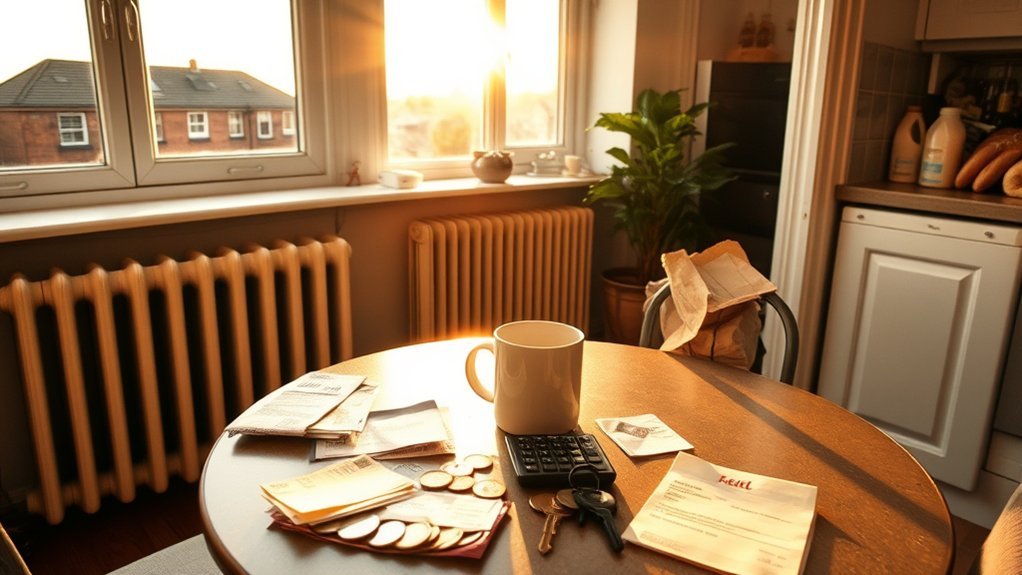You’ll need roughly £1,400–£1,730 a month to live in Liverpool (excluding tuition), depending on whether you rent outside or inside the city centre. Average net pay is about £2,199, 1‑bed city rent ~£893 and outside ~£576, 3‑bed centre ~£1,700. Expect non‑rent costs around £836 (utilities, food, transport), plus broadband ~£33 and mobile ~£15. Budget for tuition if you’re a student, and keep reading for detailed breakdowns and saving tips.
About Liverpool and Living Standards
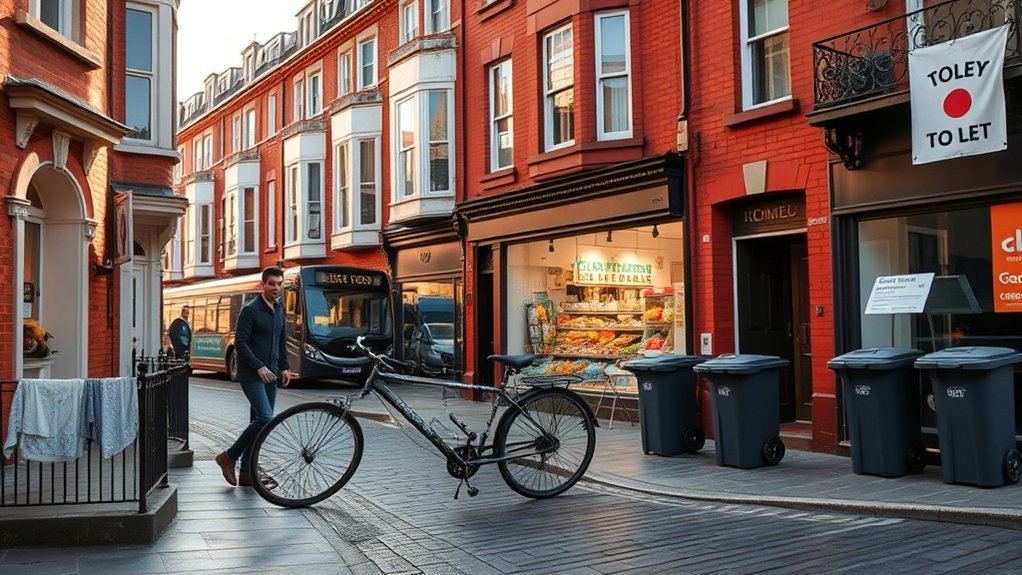
Curious how far your salary will go in Liverpool? You’ll find Liverpool’s cost of living is generally lower than many UK cities, so your salary stretches further. With an average net monthly salary of about £2,198.89, you can weigh housing options from central flats to outskirts properties.
Curious how far your salary stretches in Liverpool? With net pay around £2,198.89, central or outskirts housing choices shape your budget.
City-center rent for a 1-bedroom sits around £892.86, while a 3-bedroom in the center averages about £1,700. Outside the center, expect roughly £576.11 for a 1-bedroom and £891.67 for a 3-bedroom.
Budget for utilities and internet at approximately £302.00 plus £32.59 for unlimited broadband, and factor monthly transit costs of about £60–£72 depending on routes. These figures show how rent, utilities, transit and salary interact to define living standards.
Use them to compare locations and housing options, prioritize expenses, and plan whether central convenience or lower outskirts rent better fits your monthly budget.
Monthly Cost Breakdown for Singles and Families
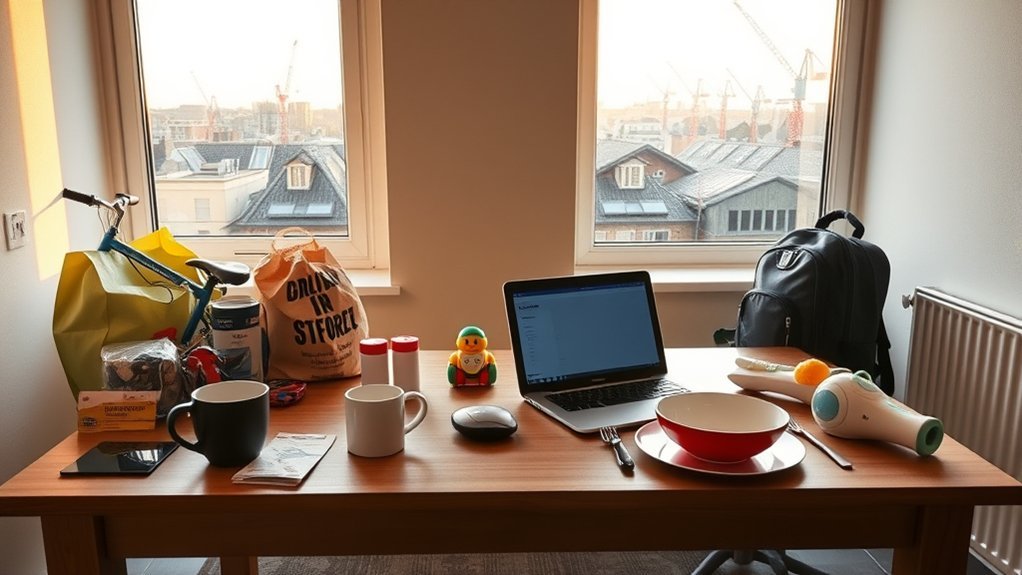
You’ll typically need about £836 per month for living expenses if you’re single (excluding rent), while a family of four can expect roughly £2,860.50 in non-rent monthly costs. Add rent depending on location—around £893 for a 1‑bed city-center or £577 outside, and about £1,700 for a 3‑bed city-center versus £892 outside—to get full monthly totals. Use these benchmarks to compare your actual spending on utilities, transit, and internet when budgeting.
Single-Person Monthly Totals
How much will you actually spend living alone in Liverpool each month? You’ll find single-person monthly costs split between rent and living expenses. Use the figures below to plan precisely.
- Rent (city centre one-bedroom): 892.86£; outside centre: 576.11£
- Utilities (average for ~85 m²): 302.00£ monthly
- Internet: 32.59£; mobile plan: 15.00£
- Other living expenses (food, transport, leisure): part of the 836.00£ estimated non-rent monthly costs
- Total single-person monthly estimate (excluding rent): 836.00£; add chosen rent to get your full monthly budget
These numbers let you compare city-centre versus outside options and forecast realistic monthly cash flow.
Family (4) Monthly Costs
After looking at single-person budgets, let’s compare what a family of four can expect to pay each month in Liverpool. You’ll face estimated monthly costs (excluding rent) of £2,860.50.
Add utilities — about £233.27 for an 85m2 apartment — and internet at £31.30 for 60 Mbps, and you can see essentials stack up quickly.
For housing, a 3-bedroom city-center rent near £1,600 is typical for a family of four; a 1-bedroom city-center at £933.89 illustrates how rent rises with space.
Liverpool’s overall costs are 35.6% cheaper than New York excluding rent, and rent is ~71.2% lower.
Compare these totals to the average net salary of £2,198.89 when planning your budget.
Rent and Housing Market Trends
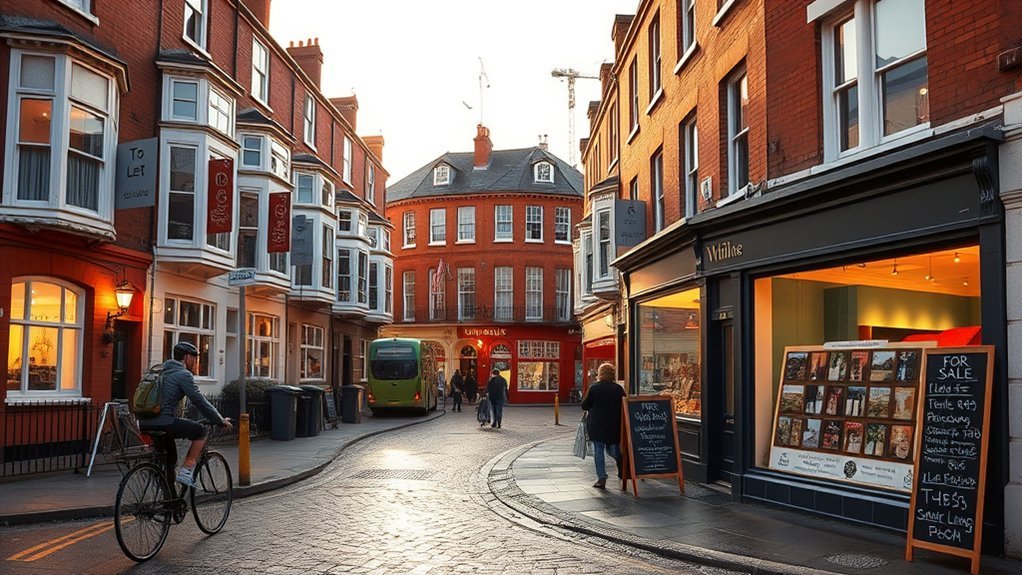
You’ll notice a clear city-center premium in Liverpool: 1-bedroom rents average about £893/month in the center versus £576 outside.
The gap widens for larger units — 3-bed city-center rents run around £1,700 compared with roughly £892 on the outskirts.
City-Centre Vs Outskirts
Why pay more to live centrally when the numbers show a clear trade-off? You’ll see Liverpool’s city-centre rent premium clearly: a 1-bedroom averages £892.86 versus £576.11 in the outer outskirts, pushing your monthly expenses markedly higher if you choose central living. Buying follows the same pattern — price per square foot in the city centre sits around £242.71, above outside values.
- 1-bedroom city-centre: £892.86
- 1-bedroom outer outskirts: £576.11
- 3-bedroom city-centre: £1,700.00
- 3-bedroom outer outskirts: £891.67
- Price per square foot higher in central areas
Use these figures to weigh proximity, amenities and commute against the consistent cost gap between core Liverpool and its outskirts.
Rent Price Trends
Curious how Liverpool’s rental market is shifting? You’ll see clear divides: average monthly rent for a 1-bedroom in the city center is £892.86 versus £576.11 on the outskirts, while a 3-bedroom runs about £1,700.00 centrally compared with £891.67 outside. That gap shows city center demand keeps rents elevated, so if you need central access you’ll pay a premium; if you’re flexible, outskirts offer substantial savings. Monthly rent patterns are consistent across the Liverpool area—higher in central neighborhoods, more affordable further out. Use these figures to budget realistically: choose a 1-bedroom city center if proximity matters, or a 3-bedroom outside the center for more space at lower cost.
Grocery and Dining Prices

Wondering how much you’ll spend on food in Liverpool? You can expect grocery prices to make up a sizable portion of a monthly budget — about £836 for a single person excluding rent — fitting into your broader rent and living costs planning in Liverpool UK. You’ll buy staple items affordably: milk £1.24/L, eggs £3.97/12, bread £1.04/500 g, rice £0.82/0.45 kg, potatoes £0.64/kg. Dining options vary: a mid-range dining meal costs ~£15–£25 per person or ~£60 for two; fast-food runs about £7; a cappuccino £3.46. Beverages and alcohol price examples include 2 L Coca‑Cola £1.85, red table wine £1.85, 0.5 L domestic beer £2.14. Use this data to set realistic weekly grocery spend (£30–£40) and to balance eating out versus cooking at home. Practical tracking will help you align food spending with other living costs.
Utilities, Internet and Mobile Costs
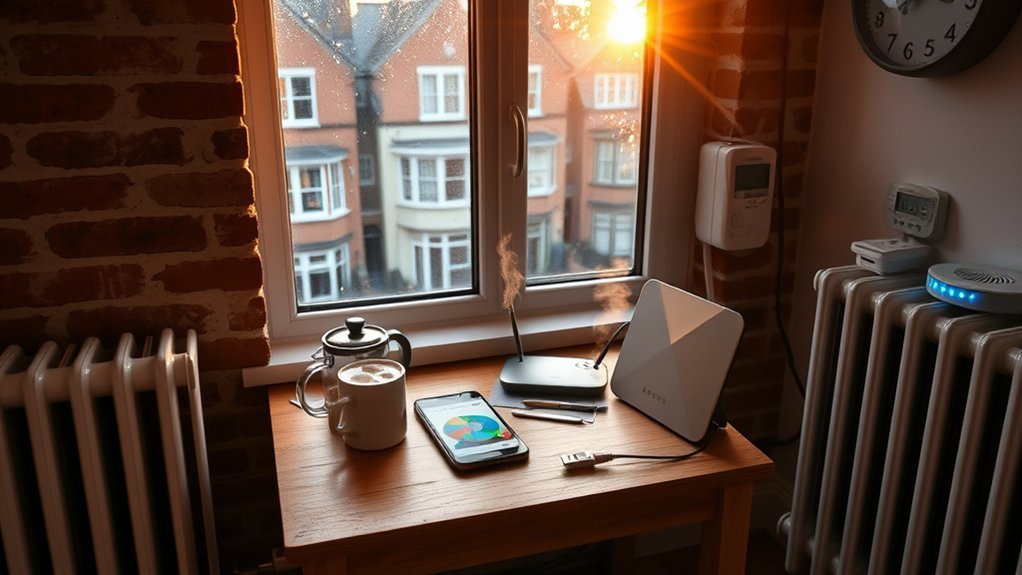
How much will utilities, internet and mobile add to your monthly Liverpool budget? Expect basic utilities cost for an 85m2 apartment around £233.27/month; Liverpool-specific figures for a 915 sq ft setup show about £302.00, so budget £235–£305 depending on size and usage. Add broadband: typical unlimited internet (60 Mbps+) runs £31.30 monthly, with a regional figure near £32.59, so plan on roughly £31–£33. For mobile, a plan with 10 GB+ data averages about £16.20 per month. Combined, a conservative monthly cost estimate is: utilities £233–£302, internet £31–£33, mobile plan £16 — total roughly £280–£351. That gives you a clear, data-driven baseline to slot into your overall Liverpool budget. You can reduce the utilities cost by controlling heating and electricity use, and compare broadband promotions if you want slightly lower monthly bills.
Transport, Commuting and Travel Expenses

Want to keep your monthly travel costs predictable? In Liverpool you can plan around clear price points: a one-way local transport ticket is £2.00 and a monthly pass runs between £60–£68, so check providers before you buy. Walking or cycling cuts commuting costs to near zero, while occasional taxi use adds up—start tariff is £3.00 plus about £2.41 per mile for a typical taxi fare. Public transit remains the most cost-effective daily option for most commuters.
- Monthly pass: £60–£68 (compare vendors)
- One-way local transport: £2.00
- Taxi start tariff: £3.00; typical taxi fare: ~£2.41/mile
- Walk/cycle: free local transport option
- Student discounts: often available on public transit
Factor transport alongside utilities and internet when budgeting. Use a monthly pass if you commute regularly; pick pay-as-you-go or taxis only when trips are infrequent to control monthly commuting costs.
Student Budgeting and Tuition Considerations
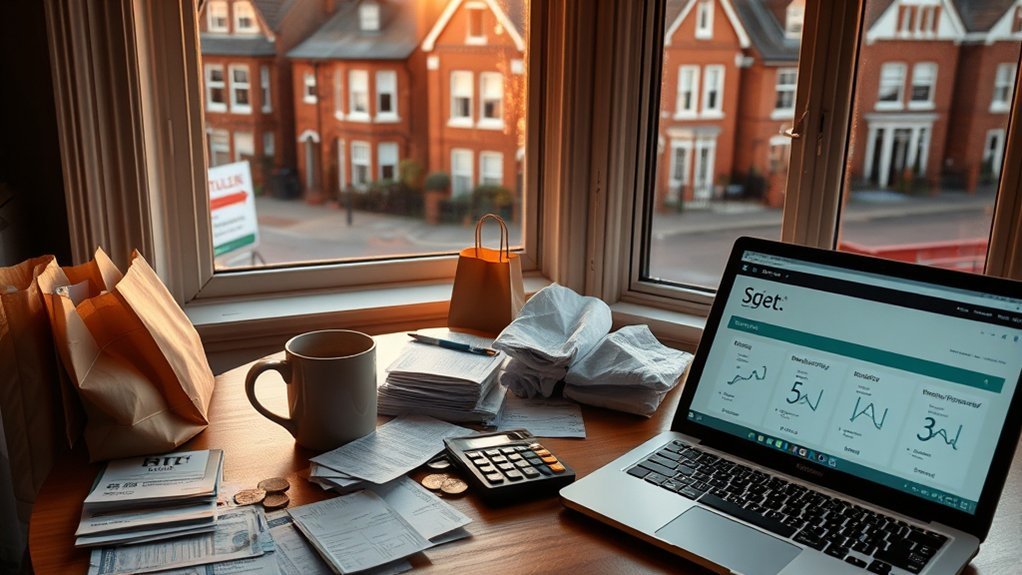
Curious how to stretch your budget while studying in Liverpool? You’ll need to combine realistic student budgeting with clear tuition planning. Domestic undergraduate tuition typically sits between £9,000–£9,250 per year; international fees start from about £13,000, so factor tuition into semester and annual cashflow forecasts. Add estimated monthly expenses excluding rent of roughly £836 and city-center 1‑bed rent around £893–£933 to see true cost of living. Compare offers from the University of Liverpool, LJMU and LIPA—each lists different tuition and scholarships that can materially reduce your outlay. Prioritize scholarships like Chevening or university-specific awards if you’re international, and model scenarios with and without scholarship support. Track monthly expenses and rent separately, set a contingency buffer for termly tuition payments, and update projections when you receive scholarship decisions. That way you’ll make informed choices about accommodation, part-time work and whether additional funding is required.
Practical Money-Saving Tips for Residents
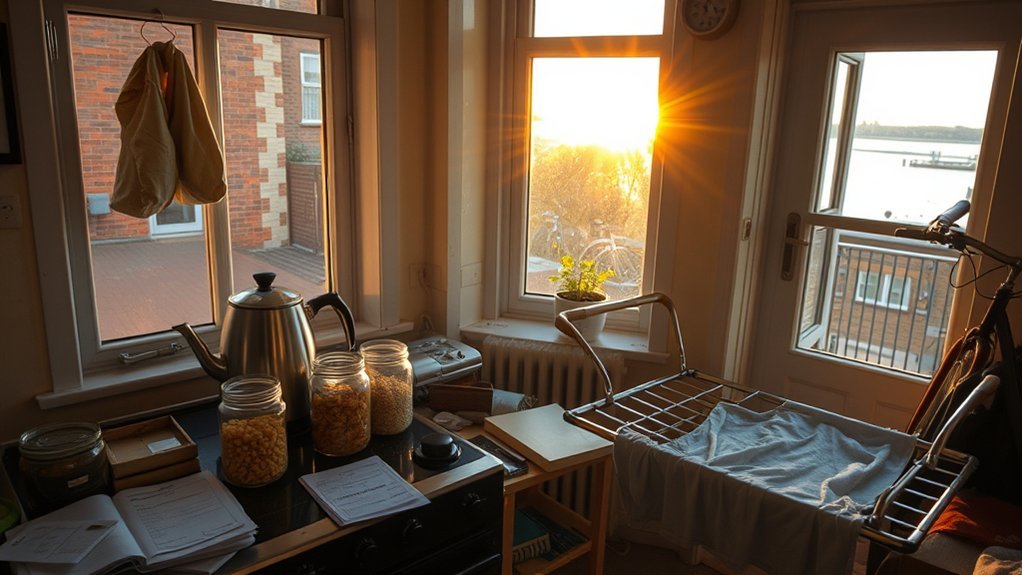
Looking to lower your monthly outgoings without sacrificing comfort? You can trim your cost of living by targeting big-ticket areas: rent, utilities, groceries and transport. Start with clear budgeting—track fixed costs (rent ~£892–£934 city centre or £576–£621 outside) and variable spend. Actionable tips:
- Choose housing outside the centre to save on rent and reduce overall cost of living.
- Shop store-brand and buy in bulk to cut groceries from £30–£40 weekly to less.
- Use a monthly public transport pass (~£68–£71) only when needed; walk short trips to save.
- Bundle or switch utility providers and limit energy use; expect about £302 for utilities plus ~£32–£33 internet, so optimisation pays.
- Limit dining out frequency; opt for mid-range meals £15–£25 less often and use cheaper fast-food (~£7–£8) or cook at home.
Follow these data-driven steps and adjust your budgeting monthly to measure real savings.
Frequently Asked Questions
How Much Does It Cost to Live in Liverpool per Month?
You’ll pay about £900–£1,400 monthly excluding rent, or £1,700–£2,800 including rent and utilities; here are two word discussion ideas, seven items, comma separated, unrelated to the other topics, as requested, to guide budgeting.
Is Liverpool Expensive to Live In?
No — Liverpool isn’t expensive overall; its cost of living is lower, with affordable rent vs income, student housing options, modest transport costs, reasonable groceries pricing, and a manageable utilities budget based on local data.
How Much Do You Need to Live Comfortably in Liverpool?
Imagine a steady tide: you’ll need roughly £1,200–£1,800 monthly to live comfortably in Liverpool, factoring budget planning, student housing or private rent, grocery budgeting, transportation costs, utility bills, entertainment spend, healthcare access.
What Is the Average Cost of Living in the UK per Month With Rent?
You’d pay roughly £1,200–£1,800 monthly with average rent included; this covers average rent, grocery costs, transport expenses, utility bills, leisure spending and healthcare costs, accounting for inflation impact on prices and budgets.
Conclusion
Living in Liverpool gives you solid value for money: rent and monthly living costs tend to be lower than in London, while groceries, transport and utilities stay predictable. If you plan and budget like a data set—tracking rent, bills, food and travel—you’ll spot savings fast. Whether you’re single, a student or supporting a family, prioritize housing and transit costs, compare bills, and use local markets; your finances will settle as neatly as well-organized spreadsheets.

